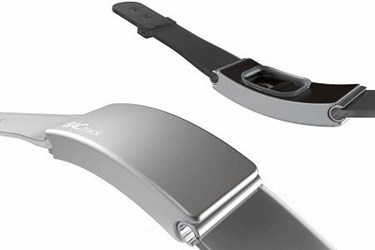Wearable Biosensor That Measures Blood Alcohol In Sweat Wins NIH Prize

The National Institute on Alcohol Abuse and Alcoholism (NIAAA), an arm of the National Institute of Health (NIH), has awarded a $200,000 prize to San Francisco-based startup BACtrack for its wristband that monitors blood alcohol concentration (BAC) in sweat. The developers say the device could aid alcoholism research and treatment.
Last year, the NIAAA launched a competition in search of a biosensor that could measure BAC in real time. The design needed to be easy to wear and capable of collecting, storing, and wirelessly transmitting data. According to NIAAA director George Koob, the device would aid researchers studying alcohol use and its effect on other medical conditions, such as liver disease and HIV/AIDS. Typically, these researchers rely on self-reported data from individuals.
“This project is designed to stimulate investment from the public and private sectors in the development of improved alcohol biosensors that will be appealing to researchers, treatment providers, and individuals,” said Koob, when the competition was announced last March.
Eight prototypes were submitted to the NIAAA and were judged based on their accuracy, frequency of measurements, data security, and marketability. All but one of the proposed devices measured BAC through perspiration, and several were styled to look like commercially available fitness trackers, according to a recent NIH press release. BACtrack, a medical device startup specializing in BAC breathalyzers, was awarded the $200,000 first prize.
“The blood alcohol monitoring devices used in legal and medical circles are big and bulky, like a ball and chain for the ones using it,” Keith Nothacker, president of BACtrack, told Reuters. “We wanted to make something people would want to wear.”
The BACtrack Skyn device is worn on the wrist and detects alcohol levels in sweat every second. An integrated proximity sensor documents when the wristband is taken on and off, and the entire device is rechargeable with a mini-USB port. An accompanying smartphone app receives and stores data through a low-power Bluetooth wireless transmitter, said Nothracker in a YouTube video.
Since it takes approximately 45 minutes for ethanol to be transmitted through the skin, BACtrack Skyn’s readings are not real-time. Due the time delay, the current design would not necessarily be useful to law enforcement as a breathalyzer alternative, explained Nothacker. However, clinicians, researchers, and consumers interested in tracking the effects of alcohol over time would benefit from the continuous monitoring, he said. The discreet design also removes any stigma that may be associated with similar devices.
Koob told Reuters that tests like breathalyzers only provide BAC levels from a specific moment in time, which does not necessarily provide an accurate picture of an individual’s alcohol use. In comparison, the Skyn “can help doctors accurately measure a patient’s drinking history, and not just depend on most recent tests. This can help a lot with treatment.”
BACtrack is still preparing documentation to submit to the FDA for approval to market Skyn in the U.S., reported Reuters.
Image credit: BACtrack
